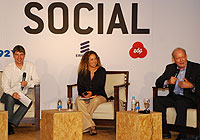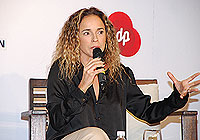Brazil
In Brazil, UNICEF Executive Director Anthony Lake discusses social media and children’s rights in the lead-up to Rio+20
 |
| © UNICEF Brazil/2012/Wong |
| UNICEF Executive Director Anthony Lake and UNICEF Brazil National Ambassador Daniela Mercury speak during the Rio+Social side event one day before the Rio+20 conference on sustainable development. |
By Pedro Ivo Alcantara
RIO DE JANEIRO, Brazil, 20 June 2012 – This week, the eyes of the world are focused on Rio de Janeiro as Brazil hosts the United Nations Conference on Sustainable Development, also known as Rio+20. The conference is capturing headlines worldwide and is prominent across social media.
UNICEF Executive Director Anthony Lake arrived in Brazil this week to participate in the conference and to send the message that children and adolescents must be at the centre of the sustainable development agenda, for, as he put it, “no one has a greater stake in the future than children.”
Speaking at a number of events, Mr. Lake emphasized that to be truly sustainable, development must also be equitable, finding innovative new ways to reach the hardest-to-reach children, and engaging young people in the global effort to build a cleaner, healthier more productive world.
Social media a critical tool
Social media are just such innovative tools, making it easier to reach further into remote communities and giving young people a greater voice in improving their own lives.
That was the message at Rio+Social, a side event hosted by the United Nations Foundation, Mashable, and the 92nd Street Y. In a conversation moderated by Brazilian Journalist Gabriel Pillar Grossi, UNICEF Brazil National Ambassador and world renowned pop singer Daniela Mercury and UNICEF Executive Director Lake spoke to a packed auditorium about social media’s crucial role both in promoting development and in humanitarian emergencies.
“UNICEF is using social media in a number of different ways – to draw attention to issues that otherwise would not get enough attention, to try to change the behaviour of people and, of course, to raise resources,” said Mr. Lake.
He pointed out some of UNICEF’s social media successes, most notably the overwhelming response to UNICEF’s Sahel Now campaign to draw attention to the food crisis in Africa’s Sahel region , where more than one million children are at risk of, or are already suffering from, severe acute malnutrition, a deadly condition.
 |
| © UNICEF Brazil/2012/Wong |
| UNICEF Brazil National Ambassador and singer Daniela Mercury speaks at the Rio+Social side event preceding the Rio+20 conference. |
“Traditional media are simply not paying very much attention to the situation. So we have been using social media to reach out through the hashtag ‘Sahel Now’ – and have reached some 160 million people around the world. This would have been impossible 10 years ago,” he said.
Working with Goodwill Ambassadors
During the discussion, Ms. Mercury, a UNICEF Brazil National Ambassador since 1995 , explained how she uses social media to communicate with fans and how these communication tools have been helping her to promote the rights of children and adolescents in Brazil and other countries – including Angola, Mozambique and Portugal – where she has many fans.
“I speak very seriously on my Twitter. Even in my songs that are rhythmically very happy, I end up talking about social issues,” said Ms. Mercury, who is one of Brazil’s most well-known singers. “I try to maintain a dialogue with my fans on social networks and stimulate them to be active in spreading UNICEF messages. They end up being ambassadors for the issue of children too.”
Mr. Lake stressed the importance of many international, regional and national ambassadors, and other celebrities, who have supported the work of UNICEF over the years and throughout the world.
“UNICEF ambassadors like Daniela are doing wonderful work using social media. For example, Mia Farrow is unbelievable going to emergencies situations and then using social media to dramatize what is happening to children in these horrible circumstances. Shakira and Selena Gomez are using their vast followings to drive more attention to problems in the Sahel. The results are more vaccines, more girls in the school, more children receiving nutrition,” Mr. Lake said.
Ms. Mercury also used the opportunity to talk to the audience about sustainability. “It doesn’t matter whether the world is richer or poorer. The crisis cannot be an excuse not to think about sustainable development. Young people expect courage from us. Social networks are the way, tools of freedom, communication for those who are having their rights violated,” she said.

